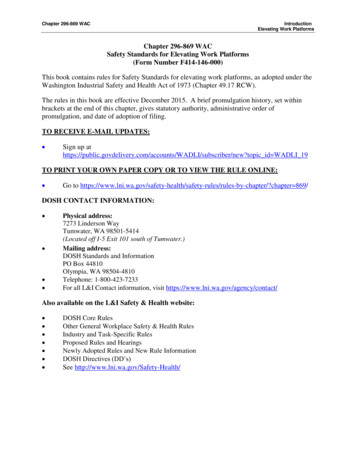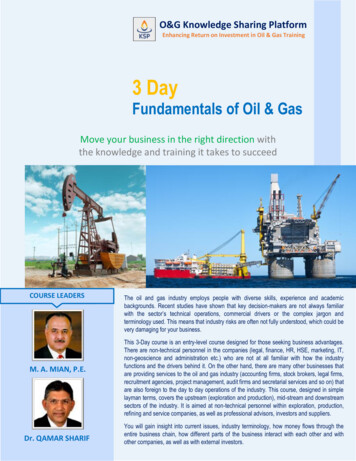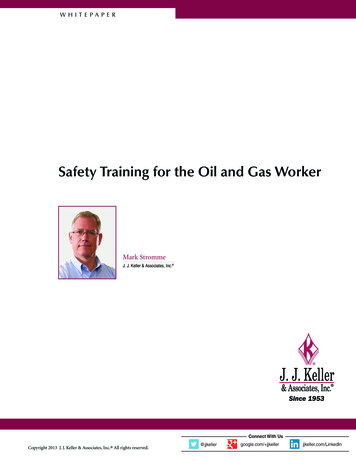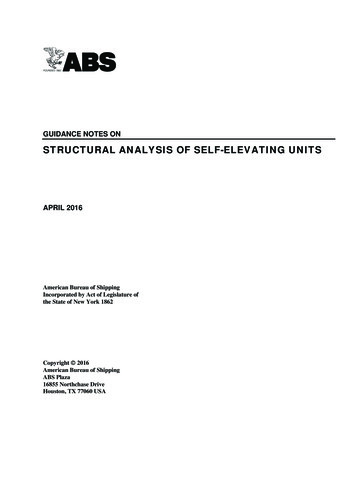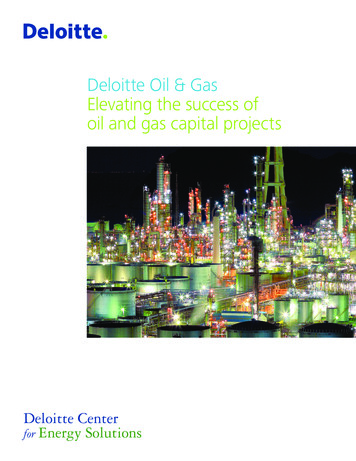
Transcription
Deloitte Oil & GasElevating the success ofoil and gas capital projectsDeloitte Centerfor Energy Solutions
As capital projectsbecome more complex,certain traditionalplanning and executionmethods are oftenineffective; therefore,intervention is required.2
Our offeringDeloitte has a distinct perspective having advised the world’sleading oil and gas companies on many challenging projectsaround the world.As oil and gas capital projects become increasingly complex andunpredictable, the tools and procedures used to plan and executethem should evolve.The evolving nature of capital projects is driving the need forchange in the oil and gas industry: 65% of [capital] projects around the world fail. Indications of projectfailure include cost overruns exceeding 25% and execution timeextending 50% or more beyond scheduled durations.1 Only 54% of projects are completed on time.2 Only 54% of projects are completed on budget.3 69% of executives are not confident that their organization isoptimizing return on invested capital for large industrial projects.4There is room for improvement.Deloitte has developed and implemented interventions on many of theworld’s largest and most challenging projects to improve project outcomesand reduce project costs. Our targeted interventions focus on enhancingcollaboration between owners and contractors, including identifying andimplementing improvements to engineering, procurement, fabrication,construction, project controls, reporting, and discipline interfaces.1234Deloitte can help significantlyreduce capital project costs.Ali Klaver, “Speed Kills,” Project Manager Magazine, December/January 2012, jects-Fail-Edward-Merrow.pdf.aspxProject Management Institute and The Boston Consulting Group, “Executive Sponsor Engagement,” Pulse of the Profession, October 2014, http://www.pmi.org/ Sponsor-Engagement.ashxProject Management Institute and The Boston Consulting Group, “Executive Sponsor Engagement.”Deloitte Dbriefs Webcast, “Capital Planning Trends: New Ways Organizations Are Adapting to Uncertain Times,” July 12, 2010.As used in this document, “Deloitte” means Deloitte LLP and its subsidiaries. Please see www.deloitte.com/us/about for a detailed description of the legal structure of Deloitte LLP and its subsidiaries. Certain services may not beavailable to attest clients under the rules and regulations of public accounting.Deloitte Oil & Gas Elevating the success of oil and gas capital projects 3
Complicated vs. complexSome projects are complicated; some are complex.5What’s the difference?Complicated projects are highly technical, such asduplicating an offshore platform, and are generallysuited for a traditional stage gate process. Theresults are typically predictable and foreseeable,despite the fact there are many interfaces betweenstakeholder groups.Complex projects are also highly technical, but theyhave a high degree of variability, such as first-of-a-kindplant technology or geography. Prescriptive (stagegate) processes are traditionally used to managethese types of projects; however, the unforeseeablenature and interactions of events make the outcomesunpredictable.Oil and gas capital projects are complex with unpredictablechallenges, and project complexity profiles can changethroughout the project lifecycle.that increase project risks and cause projects to underperform,get sidetracked, or go over budget.Many owners and contractors have adopted a stage gateprocess to manage and control large capital projects. Typically,they hypothesize that projects can achieve the desiredobjectives using a stage gate process. However, many ofthe traditional processes used to manage projects are oftenunable to identify, mitigate, or uncover the unforeseen factorsProject profileMeasure of complexityTypes of interventionRoutineBoth low organizationaland analytical complexityLend themselves to current prescriptive stage gateprocesses in terms of their degree of complication andcomplexity. They can be effectively completed usingexisting stage gate processes.Low organizational complexityand high analytical complexityThe stage gate processes continue to be followed,but there are focused teams assigned to intervene incertain processes and sub-processes, i.e., vendor datamanagement.High organizational complexityand low analytical complexityThe stage gate process is not effective and cannot befollowed. Significant intervention is required to alter thestage gate processes, i.e., governmental (national/local)and local content/social issues.Both high organizationaland analytical complexityThe probability of achieving desired results is verylow. Project alternatives should be reconsidered andthe business case should be reevaluated to reducethe degree of complexity and/or implement dynamicsystem management.Highly complicatedprojectsHighly complexprojects54Both complicated and complex projects require moreadvanced project management capabilities in order to betterforecast outcomes. Also, at some point during the lifecycle,either the degree of complication or the complexity of aproject often requires intervention from outside the projectteam to improve results.Dr. Will Allen, Complicated or complex – knowing the difference is important, #sthash.9lIS4cjN.dpuf.
Complicated projectsBuilding a second offshore platform in an area High degree of certain outcomeComplex projectsAn upstream and downstream project in a set of newfrontiers—environmental, geopolitical, technological Similarities between projects Uncertain outcome Require variety of expertise Interventions may contribute to outcome Past projects indicative of future Individual and unique Reliance on formulae No “cookie-cutter”recipe of successFigure 1: Capital project complexity profilesA capital project that is initially profiled as complicated may actually turn outto be quite complex when in the execution stage.5COMPLICATEDAdvanced ProjectManagementCOMPLEXDynamic SystemManagementAnalytical complexity Array of uncertainties and interrelated major variables Known alternatives in the business case Frequent decisions on implementation points Assumptions that need to be monitoredX4Organizational complexityOrganizational complexity Conflicting parties and range of individual andorganizational differencesYYX3ZROUTINEBasic ProjectManagement2ZCOMPLICATEDAdvanced ProjectManagement11Perceived profile23Analytical complexity45Actual profileProject X – Offshore integrated drilling, production, and storage platformProject Y – Full field LNG developmentProject Z – Offshore drilling and floating production storage and offloadingDeloitte Oil & Gas Elevating the success of oil and gas capital projects 5
A project integrator can help you, yourpeople, and your project meet its goalsAs a project sponsor, are you comfortable that you have theright people in the right places at the right times doing theright things?If not, Deloitte can help.Deloitte’s industry leading combination of multidisciplinary experience means we are distinctlyqualified to serve as your project integrator.As an integrator, Deloitte’s role is to work with you tohelp identify issues and develop a plan to help you fixwhat is not working by bringing you unbiased, actionableinformation—coupled with effective interventions—tohelp you, your people, and your project meet your goals.Deloitte can also assist in your efforts to continuouslyanalyze your capital projects complexity profile across thelifecycle, to help reduce costs and improve performance.Deloitte as yourproject integrator: Trusted advisor Real-world experiencewith many of the biggestand most challenging projects Driver and catalystfor improvementTypical Capital ProjectENGINEERING,PROCUREMENT,FABRICATION, RTNERS6OTHER EXTERNALSTAKEHOLDERS(Government, NGOs)
Project interventionsAs capital projects become more challenging andunpredictable, many of the traditional planning andexecution methods have been demonstrated to beineffective, resulting in poor project performance.How Deloitte can helpSome impactful interventions that assist clients withfacilitating capital project success include:Illustrative area of focusChallengesIllustrative interventionsImpact of interventionCapital projectcontrolsLimiting exposure to reputational riskand fines, penalties, and litigationEnhanced internal project controlframeworks enable stronger andmore effective results, with reducedcost overruns and schedule delays Reduced project cost overruns,penalties, and inefficiencies Lower frequency of “surprises”Management ofmodularizationIncreasing efficiencies and reducingpotential delays; lack of alignmentbetween engineering and fabricationrequirementsFacilitate alignment of engineeringdeliverable schedule with fabricationrequirements to enhance fabricationworkflow Reduced schedule risk Mitigated risk of change ordersand/or reworkProject experienceshortfallInexperience and lack of ability tomanage a new way of constructionsuch as unconventionalsImplement workforce knowledgetraining; incorporate industry leadingpractices Improved productivity Reduced costsVendor dataconstraintsDeviation between specs and reality;how is the scope of data collectedand shared to stakeholders?Incorporate efficiencies into acommon project bottleneck byproactively working with vendors Improved engineering efficiency Reduced schedule delay risk Limited reworkSupply chainbottlenecksManaging materials and materialsequencingAnalyze supply chain bottlenecks andimplement targeted interventions Reduced schedule delaysTax efficientsupply chainUtilizing leading legal and tax entitystructureDevelop an effective transfer pricingmethodology Cost savings from a taxefficient supply chainEquipmentstandardizationDesigning to standardized equipmentFacilitate organizational changes toincorporate standardized equipmentinto design Improved procurementcycle timing Reduced project durationLogisticsconstraintsContractor’s inability to acquirematerials (e.g., clearing customs,delivery to the site)Provide broad-based logistics analysis,planning, and execution Reduced schedule risk Mitigated expediting costsRemote laborworkforceObtaining the “right” people andthe “right” logistics; retaining skilledworkforceImplement workforce planning andtraining; develop labor assessmentand plan Improved labor productivity Mitigated risk of schedule delaysContractorperformanceAligning contractor behavior to desiredproject outcomesFacilitate alignment of stakeholderswith project goals Improved productivity Mitigated risk of project disputesPersonnelfrictionAlignment and friction betweenEPFC and owner personnelImprove alignment and reduce friction Increased productivitybetween personnel Reduced inefficienciesIneffective statusreportingFunctional snapshots of incongruentinformation used for reportingDrive improvements to reportingthrough use of executive dashboardsand key performance indicators (KPIs) Improved ability to mitigaterisks and reduce delays Improved productivityDeloitte Oil & Gas Elevating the success of oil and gas capital projects 7
8
Deloitte’s capital projects practiceImproving capital project deliveryIndustry focus: Deloitte’s capital projects practice—dedicated to the oil and gas industry—provides specializedprofessionals and resources to assist companies with theirefforts to enhance capital projects execution.Experience with major capital programs: Ourspecialists have worked on hundreds of billions of dollarsof capital projects around the globe, including some ofthe biggest and most challenging programs. Deloitteknows what it takes to help a capital project meet orexceed its goals.Depth across capital projects lifecycle: Our capitalprojects professionals have real-world industry experienceacross the project lifecycle and with many stage gateverticals.Access to a global network: Deloitte ToucheTohmatsu Limited member firms have thousandsof specialists in its global network of member firmsstrategically located around the globe and is dedicated tohelping many of the most prestigious owners and EPFCsimprove their project performance.Analytics capabilities: Deloitte helps oil and gas companiesbetter leverage processes, technology, talent, and informationthrough the use of targeted, analytics-driven roadmaps.Our innovative drilling and completions analytics solutionmay drive costs down and performance up. By applyingdata analytics to complex challenges, we help organizationseffectively benchmark costs and performance againstcompetitors, powering timely, data-driven decision-making.Capital efficiency: Our risk specialists can help quantify theimpact of project complexity and risk to enhance investmentdecisions. An effective approach to evaluate projectsprovides deeper understanding of risk and reward andenhanced decision quality in capital planning.Predictive project analytics: Deloitte’s Predictive ProjectAnalytics (PPA) significantly enhances the effectivenessof traditional project management tools. By leveragingadvanced analytics, we are able to assist clients and evaluatethe likelihood that a project will be successful—followedwith practical and actionable advice.Tax knowledge and experience: Our tax specialistsidentify and implement tax-related efficiencies by centralizingspecific management, risk, and capital intensive activities,while also developing an effective, local country transferpricing methodology. This may result in potential cost savingsfrom increased operational and tax efficiencies of centralstrategic, risk, and capital management.Human capital insights: Our specialists haveassisted capital projects in “traditional” areas, such asorganizational effectiveness, sustaining change, trainingmanagement, as well as ‘people supply chain’—that isnot only knowing what the required skills and peoplesolution should look like, but also making it happen in alikely offsite, budget-constrained environment.Deloitte Oil & Gas Elevating the success of oil and gas capital projects 9
Contact usKey contactsJohn EnglandVice Chairman, US Oil & Gas LeaderDeloitte LLP 1 713 982 2556jengland@deloitte.com@JohnWEnglandJanelia TseSenior ManagerOil & Gas Senior Sector SpecialistDeloitte Services LP 1 713 982 4670jtse@deloitte.comGreg BeanDirectorDeloitte Consulting LLP 1 713 982 3129gbean@deloitte.comAlan RichardDirectorDeloitte Transactions andBusiness Analytics LLP 1 202 378 5065arichard@deloitte.comRick CarrPrincipalDeloitte Consulting LLP 1 713 982 3894ricarr@deloitte.comKevin LanePrincipalDeloitte & Touche LLP 1 214 840 1577kelane@deloitte.comGuy LembachPartnerDeloitte Canada 1 403 503 1341plembach@deloitte.ca10Kristine RiisbergPrincipalDeloitte Tax LLP 1 212 436 7917kriisberg@deloitte.comGabriel RodriguezPartnerDeloitte Canada 1 416 601 6301garodriguez@deloitte.caMike WhalenDirectorDeloitte Transactions andBusiness Analytics LLP 1 713 982 3828miwhalen@deloitte.comNeil WhitePrincipalDeloitte & Touche LLP 1 212 436 5822nwhite@deloitte.comJeff WrightPrincipalDeloitte Tax LLP 1 713 982 4940jeffwright@deloitte.com
This publication contains general information only and is based on the experiences and research of Deloitte practitioners. Deloitte is not,by means of this publication, rendering business, financial, investment, or other professional advice or services. This publication is not asubstitute for such professional advice or services, nor should it be used as a basis for any decision or action that may affect your business.Before making any decision or taking any action that may affect your business, you should consult a qualified professional advisor. Deloitte,its affiliates, and related entities shall not be responsible for any loss sustained by any person who relies on this publication.Certain services may not be available to attest clients under the rules and regulations of public accounting.About the Deloitte Center for Energy SolutionsThe Deloitte Center for Energy Solutions (the “Center”) provides a forum for innovation, thought leadership, groundbreaking research, andindustry collaboration to help companies solve the most complex energy challenges.Through the Center, Deloitte's Energy & Resources Group leads the debate on critical topics on the minds of executives – from the impact oflegislative and regulatory policy, to operational efficiency, to sustainable and profitable growth. We provide comprehensive solutions througha global network of specialists and thought leaders.With locations in Houston and Washington, DC, the Deloitte Center for Energy Solutions offers interaction through seminars, roundtablesand other forms of engagement, where established and growing companies can come together to learn, discuss, and debate.www.deloitte.com/us/energysolutionsFollow us @Deloitte4EnergyCopyright 2015 Deloitte Development LLC. All rights reserved.Member for Deloitte Touche Tohmatsu Limited
As oil and gas capital projects become increasingly complex and unpredictable, the tools and procedures used to plan and execute them should evolve. The evolving nature of capital projects is driving the need for change in the oil and gas industry: 65% of [capital] projects around the world fail. Indications of project
